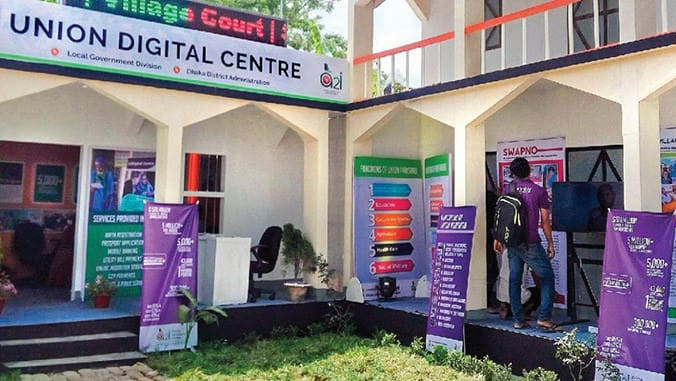Union Digital Centres and the Future of Rural Governance
A H M Masum Billah
Published: 01 Aug 2024

Photo: Collected
Union Parishad, one of the oldest local government institutions in Bangladesh, plays a crucial role in governance at the grassroots level. It is the government body closest to the people, acting as their direct link to government services and administrative functions. This proximity allows Union Parishads to address the needs and concerns of local communities more effectively than higher levels of government.
The establishment of Union Digital Centres (UDCs) has revolutionised the capabilities of Union Parishads. These centres are designed to serve as conduits for both government and non-governmental information and services, effectively bridging the gap created by the digital divide. By integrating citizens into modern information flow systems, UDCs ensure that all members of society, particularly those in rural areas, have equal access to essential services and information. This not only enhances the efficiency and accessibility of local governance but also empowers citizens by equipping them with the tools and knowledge necessary to actively participate in the digital world.
To fulfil the vision of the Father of the Nation, Bangabandhu Sheikh Mujibur Rahman, Prime Minister Sheikh Hasina commenced building the Digital Bangladesh in 2008. On 11 November 2010, she officially opened 4,501 Union Digital Centres (UDCs) across the country, taking a big step towards digital inclusion. Bangladesh successfully achieved the Vision of Digital Bangladesh by 2021. Building on the success of Digital Bangladesh, Sheikh Hasina heralded the vision of Smart Bangladesh by 2041, aiming to further advance the nation with technology and inclusive growth.
The growth of digital opportunities underscores the development of UDCs. In November 2021, 8,280 UDCs across Bangladesh started providing over 300 services. By 2024, an additional 1,000 services will be included, enhancing the existing 385 services to be available in the 9,397 centres. UDCs offer a range of services, from government-related tasks like obtaining trade licenses and land records to non-governmental services such as mobile banking, computer training and visa application processing. These centres also provide essential resources such as internet access, email services, and English education, catering to the diverse needs of the population.
The expansion of digital horizons through UDCs aligns with Smart Bangladesh’s vision of a technologically advanced and inclusive society. With its focus on Smart Citizen, Smart Economy, Smart Government, and Smart Society, Smart Bangladesh aims to transform the nation into a more digitally empowered and equitable society. UDCs are ready to play a pivotal role in this transformation, particularly in rural areas. As vital hubs, UDCs are enhancing digital access, promoting economic opportunities, providing improved government services and facilitating societal integration.
At present, nearly 20,000 entrepreneurs are working in UDCs, with each earning an average of Tk31,000. These centres significantly benefit migrant workers. Some centres have even introduced telemedicine services. UDC entrepreneurs play a crucial role in local economic development and job creation. However, to align with the Smart Bangladesh vision, entrepreneurs will undergo intensive training to enhance their skills and efficiency.
UDCs will become the cornerstone of providing rural populations with comprehensive digital access, crucial for realising the vision of Smart Bangladesh. They can ensure that every rural citizen can utilise digital technologies and resources, effectively bridging the digital divide between urban and rural areas. Strengthening digital literacy programs is essential for UDCs. These programs will teach individuals how to use various devices and access online services efficiently. By offering universal digital IDs, UDCs can help rural people easily and safely use many online services like healthcare, education and banking. This makes it easier for them to work with the government and private organisations, making society more inclusive and connected digitally. These centres provide platforms for mobile banking and digital transactions, facilitating the transition towards a cashless society. Moreover, UDCs offer training and resources for local entrepreneurship, thereby supporting the establishment and expansion of startups in rural regions. This organised method can help boost the economy and create many chances in the technology field. These actions are very important for people in rural areas because they allow them to take part in the digital economy, making life better and improving the community’s overall progress.
For making a strong contribution towards achieving the Smart Bangladesh vision, UDCs need to enhance the efficiency and responsiveness of government services for rural citizens. It is crucial that UDCs ensure rural populations receive timely and effective governmental support. The integration of technology in administrative functions leads to more transparent and accessible governance. This aspect will be further strengthened in the future. Additionally, UDCs need to facilitate the transition to paperless operations, which simplifies processes and reduces the environmental impact, thereby making government services more sustainable and efficient. To effectively promote sustainable resource management, UDCs will need to embrace advanced technologies like solar energy and IoT-based services in the future. Additionally, expanding their capacity will enable UDCs to significantly contribute to the decentralisation of technological infrastructure.
______________________________________
The writer is Director, Public Diplomacy, Ministry of Foreign Affairs

